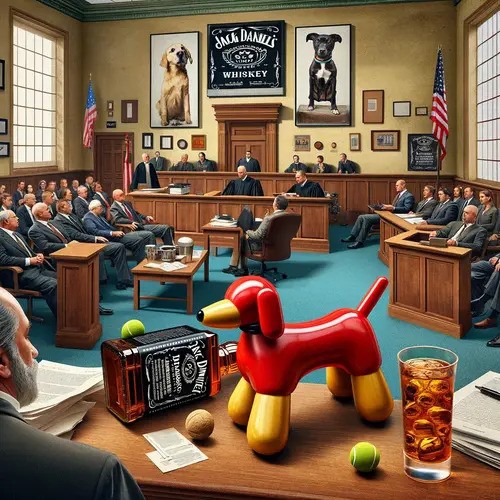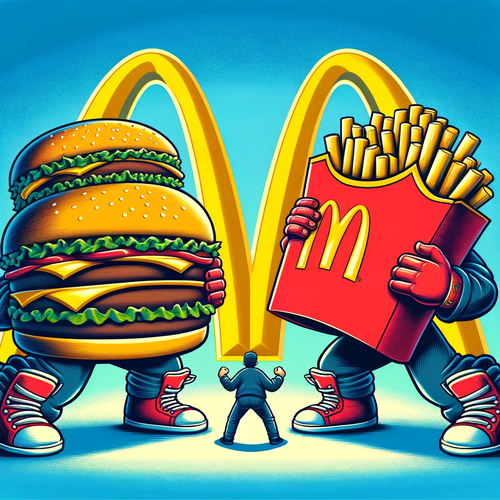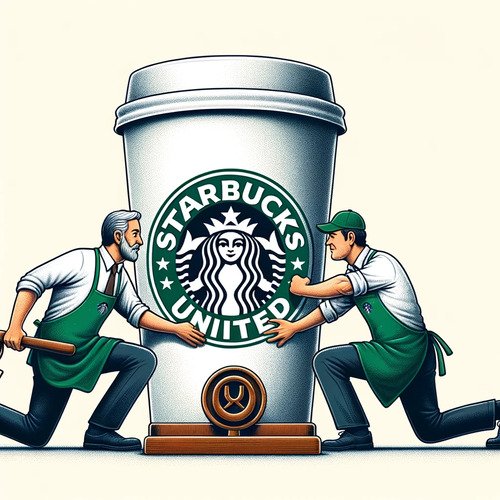Trademark Titans or Bullies? Unpacking 2023's Most Controversial Trademark Disputes
Joshua Julien Brouard
19 January 2024 • 3 min read

Table of contents
Imagine a world where David faces Goliath, not on a battlefield with slingshots and stones, but in courtrooms with trademarks and lawsuits. Welcome to 2023, a year that saw the industry giants wield their trademark office swords not just to protect but, as some argue, to conquer.
This article dives into trademark bullying and the most significant trademark disputes of the year. We unravel a saga where the lines between defending a brand and trademark bullying blur.
From the dog toy that mocked a whiskey giant to McDonald's fervent defense of their Big Mac trademark registration, these cases are not just legal skirmishes but narratives of power, perception, and the precarious balance of intellectual property rights.
1. Jack Daniel's Properties v. VIP Products: a landmark case in trademark parody

In the intriguing case of Jack Daniel's Properties v. VIP Products, the U.S. Supreme Court tackled the complex issue of parody in trademark law.
The contention centered around a dog toy designed to mimic the appearance of a Jack Daniel's whiskey bottle, leading to a legal battle over whether this constituted trademark infringement and dilution. VIP Products defended their creation as a legitimate parody.
The pivotal ruling from the Supreme Court declared that the Rogers test, usually applicable in cases of expressive works, was not applicable here, as the parody product was also serving as a source identifier for VIP's goods.
The Rogers test is a two-part legal standard used in U.S. trademark law, primarily for artistic works. First, it checks if the trademark's use in the work has artistic relevance. Second, it ensures that this use doesn't explicitly mislead about the work's origin. This test balances trademark protection with freedom of expression.
This nuanced decision has potentially far-reaching implications for how parody is treated in trademark law, particularly in cases where the parody also serves to identify the source of the product in question.
2. McDonald's big mac trademark battle: a case of alleged trademark bullying in the EU

In the case of McDonald's and their "Big Mac" trademark in the European Union, McDonald's was accused of "trademark bullying" by Supermac's, a small Irish fast-food chain.
The dispute arose when Supermac's claimed that McDonald's was hoarding trademarks and preventing other businesses from using their own brand names.
The European Union Intellectual Property Office (EUIPO) eventually ruled in favor of Supermac's, stating that McDonald's had not provided sufficient evidence of the actual use of the "Big Mac" term in the relevant period.
This case highlights a scenario where a large corporation's actions were perceived as overreaching in trademark enforcement, leading to the loss of their trademark due to lack of proper use.
This example underscores the importance of actively maintaining and defending trademark rights and the potential for large corporations to be accused of trademark bullying.
3. Starbucks' trademark dispute with its own union: a question of overreach?

In 2023, Starbucks found itself at the center of a trademark dispute with its own union, Starbucks Workers United. The conflict arose when Starbucks issued a legal threat against the union over a tweet expressing solidarity with Palestine.
The company claimed the union's use of Starbucks' name and logo in its communications could lead to a lawsuit, including possible monetary damages.
This case highlights a growing trend where large companies use trademark law in ways that some view as overreaching or bullying, especially when directed at smaller entities or internal groups like employee unions.
The situation raises important questions about the balance between protecting trademark rights and potentially suppressing free expression or organizational activities.
2023s major trademark turf wars
In summary, the rise of trademark bullying poses a significant challenge to the balance between intellectual property rights and fair competition.
This article emphasizes the need for a careful approach to trademark law to prevent trademark bullies from stifling innovation and harming small businesses while still protecting legitimate brand interests. The future of trademark law must navigate these complexities to ensure a fair and competitive market.
Looking to protect your trademark and avoid the bullies? Learn about the benefits of federal registration protection on our blog.
FAQs
What is a trademark bully?
Trademark bullies are trademark owners, often large corporations, that aggressively use trademark law to enforce their rights beyond reasonable bounds. This typically involves trademark bullying tactics, such as intimidating smaller entities with legal threats for perceived infringements that may be tenuous or overreaching.
How much does a trademark lawsuit cost?
The cost of trademark litigation can vary widely, often ranging from several thousand to millions of dollars. Factors influencing cost include the complexity of the case, the legal representation involved, and the length of the litigation process.
Can you sue if someone uses your trademark?
Yes, if someone uses your trademark without permission, especially in a way that causes confusion or dilutes your brand, you can sue for trademark infringement. Successful litigation as a trademark owner typically requires proving that your trademark was used without consent and that it led to confusion or damage.
How do you win a trademark infringement lawsuit?
To win a trademark trial, you must prove that you own a valid trademark, the defendant used a similar mark in commerce, and their use causes the likelihood of confusion or dilution. Providing clear evidence of these factors is crucial. It's advisable to seek the counsel of a law firm.
AUTHOR
Joshua J. Brouard has a diverse background. He has studied bachelor of commerce with a major in law, completed SEO and digital marketing certifications, and has years of experience in content marketing. Skilled in a wide range of topics, he's a versatile and knowledgeable writer.
Related Blogs

How to Trademark a Phrase: Complete Step...
12 June 2024 • 13 min read

What is a provisional patent?
12 June 2024 • 5 min read

How to Know if a Song Is Copyrighted | T...
06 June 2024 • 9 min read

What Is the Difference Between Copyright...
06 June 2024 • 8 min read

Can Copyright Be Renewed? Understanding ...
31 May 2024 • 7 min read
